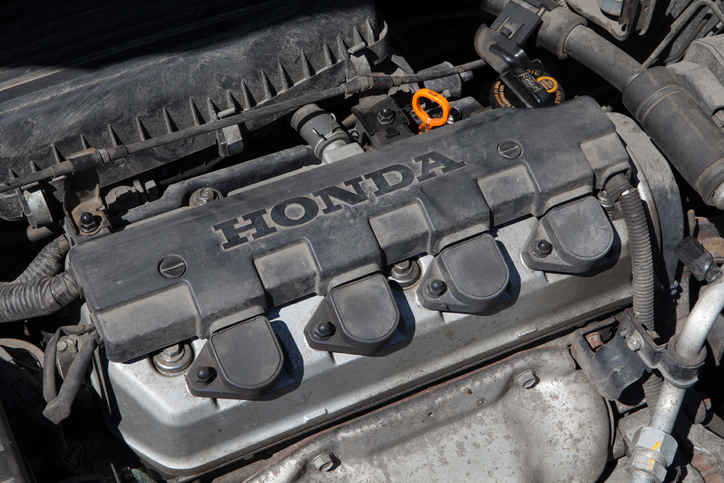If your car is leaking antifreeze, it might be time to replace the radiator. A 2001 Honda Civic radiator replacement cost can range from $120-$500. The average cost for a mechanic to replace a radiator is $250.
To do it yourself, you’ll need to buy a new radiator and some tools, which will cost about $120. The job itself isn’t too difficult, but it’s important to make sure you do it correctly so your car doesn’t overheat.

Credit: www.kseal.com
How Much Does It Cost to Replace a Radiator on a 2001 Honda Civic?
How much does it cost to replace a radiator on a 2001 Honda Civic?
If you need to replace the radiator on your 2001 Honda Civic, the average cost will be between $316 and $1,131. This includes labor costs of between $85 and $100 per hour, and parts will cost between $231 and $1,031.
The total cost will depend on how much work is needed to install the new radiator.
How Much Does It Cost for Labor to Install a Radiator?
It depends on the type of radiator you have and whether or not you need to remove the old one. For a standard, single-width radiator, expect to pay between $200 and $300 for installation. If you have a larger, double-width radiator, the cost will be closer to $400.
And if you need to remove an old radiator first, that will add another $100 or so to the total cost.
Are Radiators Worth Fixing?
Radiators are one of the most important parts of your car, and they play a vital role in keeping your engine cool. If your radiator is leaking, it’s important to get it fixed as soon as possible. A leaky radiator can cause your engine to overheat, which can lead to serious damage.
If you’re wondering whether or not it’s worth fixing a leaky radiator, the answer is yes. It may be expensive to repair, but it’s worth it to keep your car running properly.
How Much Does It Cost to Remove And Replace a Radiator?
Removing and replacing a radiator can cost anywhere from $50-$200+, depending on the type of radiator and if you are doing it yourself or hiring a professional. The most common type of radiator is the steel panel radiator, which can be found in many homes. These radiators can range in price from $50-$100, depending on the size and brand.
If you have a larger home or more radiators, the cost will be higher. Other factors that can affect the cost are the age of your home (older homes may have outdated or damaged radiators that need to be replaced), and whether or not you need to hire a professional for installation.
2001 – 2005 Honda Civic Radiator Replacement | How To DIY | EX LX DX
Honda Civic Radiator Price
A radiator is one of the most important components of a car, and the Honda Civic is no exception. This part of the car helps to keep the engine cool, and it also prevents overheating. The radiator price for a Honda Civic can vary depending on the model and year of the vehicle.
For instance, a radiator for a 2006 Honda Civic may cost more than a radiator for a 2004 model. In addition, aftermarket options may be available that can save you money. When shopping for a new radiator, it is important to compare prices and features in order to find the best deal.
2008 Honda Civic Radiator Replacement Cost
If your 2008 Honda Civic is in need of a new radiator, you may be wondering about the cost. Here is a breakdown of what you can expect to pay for this repair.
Parts: The cost of the actual radiator will vary depending on where you purchase it from.
Expect to pay anywhere from $100-$300 for the part itself.
Labor: The labor involved in replacing a radiator is not overly complicated, but it will take some time. Most mechanics will charge between $50-$100 per hour of labor, so expect to pay somewhere in that range for the job to be completed.
Total Cost: When all is said and done, you can expect to pay between $150-$400 to have your 2008 Honda Civic’s radiator replaced.
2002 Honda Civic Radiator Replacement
The radiator in your 2002 Honda Civic is an important part of your car’s cooling system, and it needs to be replaced if it becomes damaged. A new radiator can cost anywhere from $200 to $400, depending on the make and model of your car. If you’re not sure how to replace a radiator, there are plenty of tutorials online that can walk you through the process step-by-step.
It’s a relatively easy repair that anyone with basic mechanical skills can do, and it’s definitely worth doing yourself if you’re trying to save money.
Honda Accord Radiator Replacement Cost
Your car’s radiator is one of the most important parts of its cooling system, and it’s vital to keep it in good working order. If your radiator starts to leak, it can cause serious engine damage. So, if you need to replace your Accord’s radiator, how much will it cost?
On average, a Honda Accord radiator replacement cost will be between $400 and $550. This includes parts and labor costs. Of course, the exact price will depend on the year and model of your Accord, as well as the specific circumstances of your repair.
For example, if your car needs additional repairs along with the radiator replacement (such as a new water pump), then your total cost will be higher.
If you have a warranty on your car, then you may be able to get some or all of the costs covered by insurance. However, even if you do have to pay for the repairs yourself, replacing your Accord’s radiator is still cheaper than having to buy a new car!
So don’t delay – if you think there might be a problem with your radiator, take it to a mechanic right away for an inspection.
Honda Civic 2008 Radiator Price
If you’re in the market for a new radiator for your Honda Civic, you may be wondering how much it will cost. Here’s a look at the average prices of radiators for a 2008 Honda Civic:
Aftermarket Radiator: $100-$200
OEM Radiator: $300-$400
As you can see, there is quite a price difference between aftermarket and OEM radiators. Aftermarket radiators are typically less expensive, but they may not offer the same quality or fitment as an OEM radiator.
If you’re looking for the best possible option, an OEM radiator is usually the way to go. However, if you’re on a budget, an aftermarket radiator could be a good option.
2000 Honda Civic Radiator
A radiator is a type of heat exchanger. It is used to transfer heat from one medium to another. The most common type of radiator is the air-cooled radiator, which uses air as the medium to transfer heat.
The 2000 Honda Civic radiator is made of aluminum and is designed to keep the engine coolant at a temperature that will not damage the engine. The coolant flows through the radiator and is cooled by the air that passes through it. The coolant then flows back into the engine where it absorbs heat from the engine and transfers it back to the radiator where it can be cooled again.
The 2000 Honda Civic has two radiators, one in front of the engine and one in back of it. The front radiator is called the primary radiator and the rear one is called the secondary radiator. There are also cooling fans mounted on both radiators that help move air through them and keep them cool.
If your 2000 Honda Civic starts to overheat, it may be due to a problem with one or both of its radiators. If you notice any leaks or other damage, you should have your vehicle checked by a mechanic as soon as possible so that they can make repairs if necessary.
2010 Honda Civic Radiator
When your engine starts to overheat, one of the first places you should check is the radiator. The radiator in your 2010 Honda Civic is responsible for keeping the engine cool by circulating coolant through it. If there is a problem with the radiator, it can cause the engine to overheat and potentially damage it.
There are a few things that can go wrong with the radiator in your 2010 Honda Civic that would cause it to stop working properly.
One possibility is that there is a leak in the radiator. This can be caused by a number of things, such as a loose hose or a crack in the radiator itself.
If you think there may be a leak, you should take your car to a mechanic so they can pressure test the system and locate the leak. Another possibility is that the radiator fans are not working properly. The fans are responsible for cooling down the coolant as it circulates through the radiator.
If they are not working, then the coolant will not get cooled down and this can cause overheating.
2012 Honda Civic Radiator Replacement
If your 2012 Honda Civic is in need of a radiator replacement, there are a few things you should know. First, radiators can be expensive, so it’s important to do your research and find a reputable dealer or mechanic. Second, while replacing the radiator is not a difficult task, it is important to follow instructions carefully and take all necessary precautions.
Finally, once your new radiator is installed, be sure to properly maintain it to avoid future problems.
For more detailed information about 2012 Honda Civic radiator replacement, please consult your owner’s manual or speak with your dealer or mechanic.
Conclusion
Although the cost of replacing a radiator in a 2001 Honda Civic may be expensive, it is worth it to do the repair properly. A new radiator will last much longer and provide better cooling for your car. Make sure to get a quote from a reputable mechanic before getting the work done.

